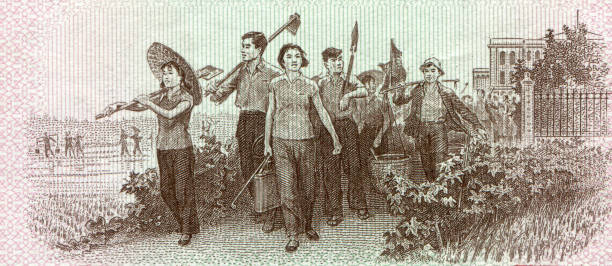
Socialism is a social and economic theory that advocates for public ownership and control of property and natural resources rather than private ownership and management. Individuals do not live or work in isolation, according to the socialist viewpoint, but rather in collaboration with one another. Furthermore, everything that people create is a social product in some way, and everyone who contributes to the creation of a good is entitled to a portion of it. As a result, society as a whole should own or at the very least control property for the benefit of all of its members.
This belief pits socialism against capitalism, which is based on private ownership of the means of production and allows individuals to choose how commodities and services are distributed in a free market.
Socialists argue that capitalism inevitably results in unequal and exploitative concentrations of wealth and power in the hands of the few individuals who emerge triumphant from the free-market competition—individuals who then utilise their money and influence to entrench their dominance in society. Because such people are wealthy, they may pick where and how they live, limiting the possibilities available to the poor. As a result, phrases like individual liberty and fair opportunity may have value for capitalists, but they are meaningless to working people who must do the capitalists’ bidding in order to survive. True freedom and equality, according to socialists, necessitate societal management of the resources that underpin any society’s success.
What Is Socialism?

Answering the topic of what exactly socialism is can be difficult because socialists themselves vary on the subject. It’s an amorphous term that refers to a diversified community with many opposing viewpoints. According to common belief, socialism entails “government control of the means of production.” But this is manifestly incorrect: many socialists in the past considered themselves full anarchists who sought to abolish government completely.
The concept of “worker control” is a better definition, at least in terms of the economic side of socialism. The concentration of money and power in the hands of a small number of people has always irritated socialists. They have asked for a fair part of the riches to be distributed to ordinary workers.
The specifics differ, but all socialists share a hatred for the class structure, which allows some people to work extremely hard their entire lives and finish up with little, while others get to create money while sleeping just by owning stuff. Socialists believe that if you work for a firm, you should benefit from its success and have a role in how it is run.
How Socialism Works
Socialist theory aims to create a utopian society, with various interpretations of the ideal system. Every type champions inter-group cooperation and avoids capitalism’s competitive “evils”.
In capitalism, supply and demand dictate prices. If demand for flour increases, profit-driven bakeries raise prices. Conversely, a decline in tea popularity would lower its price and production.
However, in a true socialist economy, the government sets output and pricing levels. Aligning these decisions with consumer needs poses a challenge. Socialist economists like Oskar Lange suggest central planners can avoid production inefficiencies by responding to inventory levels. Hence, tea surplus in stores indicates a need for price reduction, and vice versa.
Critics of socialism argue that, while authorities can alter prices, the lack of competition among producers reduces the incentive. They contend that public production control inevitably results in an inefficient, bloated bureaucracy. Theoretically, a single central planning committee could oversee the pricing of thousands of products, complicating swift responses to market cues.
Furthermore, the concentration of power within the government has the potential to create an environment in which political reasons take precedence over people’s basic necessities. Indeed, although the Soviet Union was allocating massive resources to strengthen its military, its citizens often had difficulty obtaining a range of items, such as food, soap, and even television sets.
What Draws People To Socialism
Socialists have offered many arguments for socialism. Since socialism does not have a single meaning and different people believe in different aspects of it, some arguments may resonate better to some than others. However, here are some of the most important, generally accepted socialist arguments that draw people to socialism.
To begin with, they contend that socialism is far more democratic than capitalism. It gives ordinary people, not just wealthy individuals, the ability to make economic decisions.
Second, socialists claim that socialism will use our communal resources to meet everyone’s basic necessities. Some people would no longer be obscenely wealthy while others would be relegated to begging on the street. Food, shelter, health care, education (including college), and retirement support would all be “decommodified,” meaning that they would be provided to everyone regardless of their capacity to pay.
Third, advocates claim that socialism would considerably lessen the extreme economic disparities that exist in capitalist countries such as the United States, where CEOs are paid up to 278 times the rate of average workers, according to a recent analysis by the Economic Policy Institute. The highest-to-lowest-paid ratio at Spain’s Mondragón cooperatives, which are owned and governed by their workers, is closer to 5:1.
Fourth, socialists claim that their economic system will remove the vast wealth disparities that exist in capitalist countries. The economy’s commanding heights are owned by a small elite under capitalism. Ownership of primary means of production will be spread and democratised under socialism, according to supporters. According to socialists, the consequence is a profoundly egalitarian, classless economy in which everyone owns something.
Finally, socialists say that by reducing (though not fully abolishing) profit-driven economic competition, socialism makes room for a more cooperative, kinder, and less alienating economy that considers workers as individuals rather than disposable inputs.
Final Thoughts
In any case, economists have yet to find a truly socialist — or, for that matter, a purely capitalist — society. After all, the United States, which is regarded as one of the world’s most successful capitalist economies, employs a variety of socialist-inspired programmes to assist its financially disadvantaged residents. For the time being, it appears that mixed economies, which combine socialist and capitalist features, are far more feasible.
Before You Go…
Hey, thank you for reading this blog to the end. I hope it was helpful. Let me tell you a little bit about Nicholas Idoko Technologies. We help businesses and companies build an online presence by developing web, mobile, desktop, and blockchain applications.
We also help aspiring software developers and programmers learn the skills they need to have a successful career. Take your first step to becoming a programming boss by joining our Learn To Code academy today!
Be sure to contact us if you need more information or have any questions! We are readily available.
[E-Books for Sale]
1,500 AI Applications for Next-Level Growth: Unleash the Potential for Wealth and Innovation
$5.38 • 1,500 AI Applications • 228 pages
Are you ready to tap into the power of Artificial Intelligence without the tech jargon and endless guesswork? This definitive e-book unlocks 1,500 real-world AI strategies that can help you.
See All 1,500 AI Applications of this E-Book
750 Lucrative Business Ideas: Your Ultimate Guide to Thriving in the U.S. Market
$49 • 750 Business Ideas • 109 pages
Unlock 750 profitable business ideas to transform your future. Discover the ultimate guide for aspiring entrepreneurs today!
See All 750 Business Ideas of this E-Book
500 Cutting-Edge Tech Startup Ideas for 2024 & 2025: Innovate, Create, Dominate
$19.99 • 500 Tech Startup Ideas • 62 pages
You will get inspired with 500 innovative tech startup ideas for 2024 and 2025, complete with concise descriptions to help you kickstart your entrepreneurial journey in AI, Blockchain, IoT, Fintech, and AR/VR.
We Design & Develop Websites, Android & iOS Apps
Looking to transform your digital presence? We specialize in creating stunning websites and powerful mobile apps for Android and iOS. Let us bring your vision to life with innovative, tailored solutions!
Get Started Today



